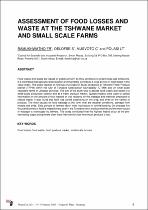JavaScript is disabled for your browser. Some features of this site may not work without it.
- ResearchSpace
- →
- Research Publications/Outputs
- →
- Conference Publications
- →
- View Item
| dc.contributor.author |
Ramukhwatho, Fhumulani R

|
|
| dc.contributor.author |
Oelofse, Suzanna HH

|
|
| dc.contributor.author |
Musvoto, Constansia D

|
|
| dc.contributor.author |
Polasi, Letlotlo T

|
|
| dc.date.accessioned | 2021-05-19T11:10:26Z | |
| dc.date.available | 2021-05-19T11:10:26Z | |
| dc.date.issued | 2021-02 | |
| dc.identifier.citation | Ramukhwatho, F.R., Oelofse, S.H., Musvoto, C.D. & Polasi, L.T. 2021. Assessment of food losses and waste at the Tshwane market and small scale farms. http://hdl.handle.net/10204/12015 . | en_ZA |
| dc.identifier.isbn | 978-1-928535-55-3 | |
| dc.identifier.uri | http://hdl.handle.net/10204/12015 | |
| dc.description.abstract | Food losses and waste are issues of global concern as they contribute to greenhouse gas emissions. It is estimated that agricultural production and marketing contribute a large portion of food waste in the value chain. This paper reports on findings of a research study conducted in Tshwane Fresh Produce Market (TFPM) within the City of Tshwane Metropolitan Municipality (CTMM) and on small-scale vegetable farms in Limpopo province. The aim of the study was to assess food losses and waste in a small-scale production context and at a fresh produce market. Questionnaires were used to collect information on the amount of food wasted or lost, reasons for the wastage and methods employed to reduce waste. It was found that food loss varied depending on the crop, and even on the variety of produce. The main causes for food wastage at the farm level are weather conditions, damage from insects and birds. Sixty percent of farmers divert their food waste for animal feeding. On average five thousand tonnes of food is wasted every year in the Tshwane fresh produce market and the main cause of wastage is oversupply by farmers. The study concluded that the highest losses occur at the preharvesting stage and growers often have little control over how much produce is lost. | en_US |
| dc.format | Fulltext | en_US |
| dc.language.iso | en | en_US |
| dc.relation.uri | https://issuu.com/glen.t/docs/resource_nov_2020/s/11383033 | en_US |
| dc.source | WasteCon 2020, Emperors Place, Gauteng, South Africa, 9-11 February 2021 | en_US |
| dc.subject | Food losses | en_US |
| dc.subject | Food waste | en_US |
| dc.subject | Fresh produce market | en_US |
| dc.subject | Small scale farmers | en_US |
| dc.title | Assessment of food losses and waste at the Tshwane market and small scale farms | en_US |
| dc.type | Conference Presentation | en_US |
| dc.description.pages | 8 | en_US |
| dc.description.note | Paper prepared for WasteCon 2020, Emperors Place, Gauteng, South Africa, 9-11 February 2021 | en_US |
| dc.description.cluster | Smart Places | |
| dc.description.impactarea | Waste Benefication | en_US |
| dc.identifier.apacitation | Ramukhwatho, F. R., Oelofse, S. H., Musvoto, C. D., & Polasi, L. T. (2021). Assessment of food losses and waste at the Tshwane market and small scale farms. http://hdl.handle.net/10204/12015 | en_ZA |
| dc.identifier.chicagocitation | Ramukhwatho, Fhumulani R, Suzanna HH Oelofse, Constansia D Musvoto, and Letlotlo T Polasi. "Assessment of food losses and waste at the Tshwane market and small scale farms." <i>WasteCon 2020, Emperors Place, Gauteng, South Africa, 9-11 February 2021</i> (2021): http://hdl.handle.net/10204/12015 | en_ZA |
| dc.identifier.vancouvercitation | Ramukhwatho FR, Oelofse SH, Musvoto CD, Polasi LT, Assessment of food losses and waste at the Tshwane market and small scale farms; 2021. http://hdl.handle.net/10204/12015 . | en_ZA |
| dc.identifier.ris | TY - Conference Presentation AU - Ramukhwatho, Fhumulani R AU - Oelofse, Suzanna HH AU - Musvoto, Constansia D AU - Polasi, Letlotlo T AB - Food losses and waste are issues of global concern as they contribute to greenhouse gas emissions. It is estimated that agricultural production and marketing contribute a large portion of food waste in the value chain. This paper reports on findings of a research study conducted in Tshwane Fresh Produce Market (TFPM) within the City of Tshwane Metropolitan Municipality (CTMM) and on small-scale vegetable farms in Limpopo province. The aim of the study was to assess food losses and waste in a small-scale production context and at a fresh produce market. Questionnaires were used to collect information on the amount of food wasted or lost, reasons for the wastage and methods employed to reduce waste. It was found that food loss varied depending on the crop, and even on the variety of produce. The main causes for food wastage at the farm level are weather conditions, damage from insects and birds. Sixty percent of farmers divert their food waste for animal feeding. On average five thousand tonnes of food is wasted every year in the Tshwane fresh produce market and the main cause of wastage is oversupply by farmers. The study concluded that the highest losses occur at the preharvesting stage and growers often have little control over how much produce is lost. DA - 2021-02 DB - ResearchSpace DP - CSIR J1 - WasteCon 2020, Emperors Place, Gauteng, South Africa, 9-11 February 2021 KW - Food losses KW - Food waste KW - Fresh produce market KW - Small scale farmers LK - https://researchspace.csir.co.za PY - 2021 SM - 978-1-928535-55-3 T1 - Assessment of food losses and waste at the Tshwane market and small scale farms TI - Assessment of food losses and waste at the Tshwane market and small scale farms UR - http://hdl.handle.net/10204/12015 ER - | en_ZA |
| dc.identifier.worklist | 24540 | en_US |






